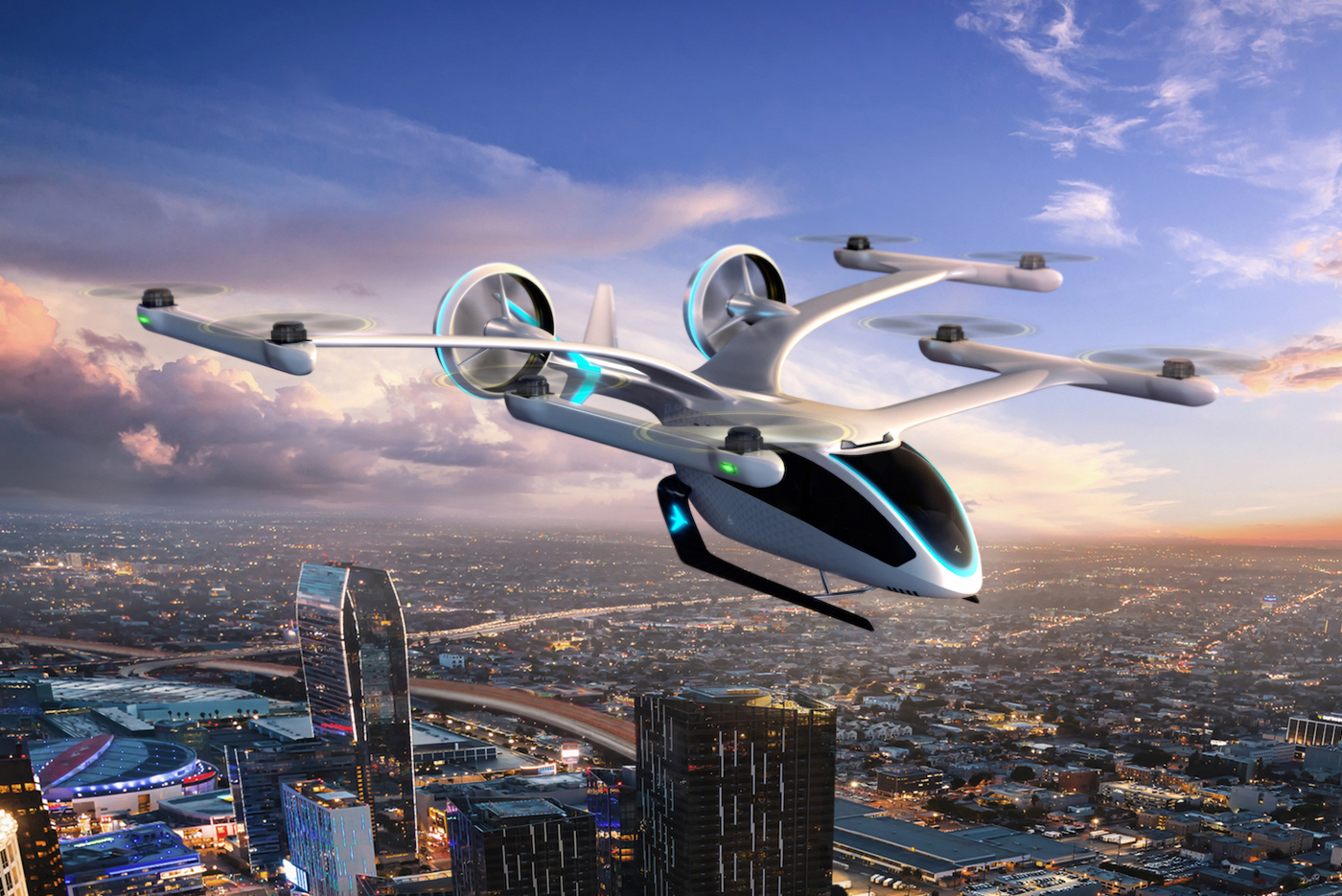What are eVOLTs flying cars?
Flying cars, also known as eVTOLs (electric vertical take-off and landing vehicles), are a groundbreaking innovation in urban transportation. These vehicles are 100% electric and have vertical take-off and landing capabilities. Enabling them to navigate congested city streets with ease.
The expectation surrounding flying cars is immense, as they have the potential to revolutionize urban mobility. By providing a fast, cost-effective, and environmentally-friendly mode of transportation. They aim to alleviate traffic congestion and reduce carbon emissions, making cities cleaner and more livable.
With a range of 60 miles (100 kilometers), flying cars offer a wide array of urban mobility solutions. They promise to transport people swiftly to airports and various destinations within cities. All while emitting zero carbon emissions, promoting sustainability, and reducing the carbon footprint.
The partnership between Embraer and Eve Air Mobility marks a significant milestone in the development and production of flying cars. Taubaté, a city in the interior of São Paulo, Brazil, was chosen as the manufacturing location. Due to its strategic logistical advantages and proximity to Embraer’s headquarters, ensuring efficient production processes.
Embraer’s impressive portfolio of 2,800 eVTOL orders, amounting to over $8 billion in sales, reflects the growing interest from helicopter operators, airlines, leasing companies, and shared flight platforms. These pre-orders are a testament to the confidence and excitement surrounding the future of flying cars.
As the Eve and United Airlines partnership aims to introduce flying cars in San Francisco. Is the potential economic benefits and job creation are also in the spotlight. The planned certification in 2026 and real-scale test flights by 2024 are vital steps toward realizing this vision of urban air mobility.
The partnership between Embraer and Eve Air Mobility for flying cars
In the exciting realm of urban mobility, the flying cars, or eVTOLs, has emerged as a game-changer. A significant partnership between Embraer and Eve Air Mobility, an Embraer-controlled company, is at the forefront of this revolution. The strategic collaboration aims to produce eVTOLs in the existing Embraer facility located in Taubaté, São Paulo.
This decision highlights Taubaté’s importance as a manufacturing hub for these cutting-edge vehicles. By leveraging the proximity to Embraer’s headquarters in São José dos Campos, the production process is expected to gain agility and competitiveness. The abundance of engineering talent in the area will also foster the development of novel production techniques.
The ambitious plan is set to make the first eVTOL models roll off the production line in Taubaté by 2026. However, the expansion is contingent upon final approval from the relevant authorities. This strategic move not only reinforces Embraer’s commitment to innovation but also solidifies Brazil’s position as a key player in the flying car industry.
As a renowned aerospace manufacturer, Embraer’s expertise combined with Eve Air Mobility’s vision sets the stage for groundbreaking advancements in urban air transportation. As both companies work in synergy, the dreams of a futuristic urban mobility system come closer to reality.
The joint effort aims to revolutionize how people travel within cities and reach airports efficiently, with reduced environmental impact. The integration of Eve Air Mobility into Embraer’s umbrella promises seamless coordination between engineering and resources. Ensuring a smooth and successful production process.
Economic impact and jobs
The partnership between Embraer and Eve Air Mobility to manufacture flying cars, also known as eVTOLs, in Taubaté, Brazil, heralds promising economic prospects for the city. With a strategic location and existing infrastructure, Taubaté is poised to reap substantial benefits from this visionary initiative. One significant advantage of this collaboration is the potential for generating highly-skilled job opportunities.
The production of cutting-edge eVTOLs will require a skilled workforce. Providing employment opportunities for local residents and attracting talent from surrounding areas. Moreover, the project’s magnitude is expected to attract substantial investments in research and development. With both Embraer and Eve Air Mobility committed to innovation.
The city of Taubaté stands to become a hotbed for technological advancements in the urban air mobility sector. Furthermore, the joint venture’s presence in Taubaté is likely to elevate the city’s technological visibility on a national and international level. As a hub for manufacturing eVTOLs, Taubaté will gain prominence in the global aerospace industry.
Attracting, like this, attention from investors and businesses worldwide. This technological visibility could also lead to potential collaborations with other companies and institutions, fostering knowledge exchange and further boosting the region’s technological prowess.
Overall, the flying car initiative is not only set to transform urban transportation but also presents a multitude of economic opportunities for Taubaté. The creation of high-quality jobs, increased research and development investments, and enhanced technological visibility will fuel the city’s growth and position it as a key player in the burgeoning field of urban air mobility.
The schedule and expectation of operation
The timeline for flying cars, or eVTOLs, is of utmost significance in realizing their potential in urban mobility. The schedule entails two crucial milestones: certification and real-scale test flights. Certification is expected to be achieved by 2026, a critical step that ensures the safety and regulatory compliance of eVTOLs. This milestone marks the green light for their widespread adoption as a mode of transportation.
However, before full-scale operation, a real-scale test flight is scheduled for 2024. This trial run is essential in validating the performance, safety, and efficiency of eVTOLs in real-world conditions. To ensure seamless operation, the project’s success heavily relies on the careful definition of the areas of origin and destination for flights.

Identifying suitable locations in cities, where flying cars can take off and land, is vital to avoiding conflicts with existing infrastructure and ensuring smooth operations. Moreover, establishing an efficient urban air mobility network is pivotal. A well-connected and organized network of routes and landing spots will facilitate the integration of eVTOLs into the existing transportation ecosystem.
These coordinated efforts in defining flight areas and building a comprehensive urban air mobility network contribute to the overall viability and success of flying cars. By adhering to the timeline and laying the groundwork for operational excellence, the eVTOLs are poised to revolutionize urban transportation, offering a fast, eco-friendly, and congestion-reducing travel option in the skies.


